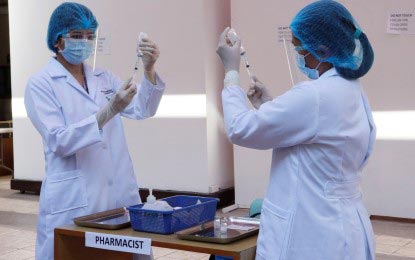
DESPITE having the second-highest count of COVID-19 cases in Southeast Asia, the Philippines has not vaccinated any health care workers, according to a recent report by the National Public Radio (NPR).
In its article released on Thursday, February 18, it noted that “not a single health worker in the Philippines has been vaccinated” this week.
“The fear and anxiety among these workers has led more than a few to take a leave or quit their jobs during this public health crisis,” read the article written by NPR reporter Julie McCarthy.
The Philippines has roughly 1,700 new cases of COVID-19 each day, with more than half-million total confirmed cases, second only to Indonesia in the region.
Dr. Charles Marquez, a community doctor in the southernmost island of Mindanao, told NPR that the country’s lack of a more aggressive rollout has produced high anxiety among many frontline workers.
According to him, doctors and nurses putting their lives on the line daily to save COVID-19 patients are battling “fatigue, depression and stress.”
The stress of working in such “a dangerous environment” has taken a toll on the health of frontliners, noted NPR.
“[Marquez] says they’re calling in sick and not because they have the coronavirus but because of ‘stress and anxiety,’” it added.
Currently, the Philippines is preparing for the arrival of its first COVID-19 vaccines this month to start its national rollout program. The first vaccine jabs set to arrive in the country are from Pfizer-BioNTech through the COVAX facility.
Backed by the World Health Organization (WHO), the assistance program was set up to ensure that the scramble for vaccines among rich countries did not leave poorer nations out in the cold and expects to deliver two to three billion doses this year.
However, the delivery of Pfizer jabs to the Philippines scheduled in February is facing a delay.
WHO representative Rabindra Abeyasinghe said that Pfizer has yet to submit an indemnification agreement before the delivery can start.
“What the Philippines signed is the COVAX indemnification agreement. Unfortunately, we are still waiting for an indemnification agreement coming from the manufacturer, in this case it’s Pfizer-BioNTech,” he said at the televised public briefing on Thursday.
Abeyasinghe assured that the COVAX facility is working closely with Pfizer to make sure that the pharmaceutical firm sends out the indemnification agreement.
‘Be patient’
Philippine vaccine czar Carlito Galvez Jr., for his part, urged the public to be patient amid the vaccine shipment delay.
“We advise our fellow citizens to give a bit of patience,” he said in Filipino during the COVID-19 Coordinated Operations to Defeat Epidemic (C.O.D.E.) Team visit to the municipality of Pateros.
“Our negotiation with COVAX facility is still ongoing and we are hopeful that they will fulfill their commitment to bring us the 44 million doses here in the first and second quarter,” he added.
Galvez also noted that the delay is likewise being experienced by other countries.
However, many Filipino frontliners have already developed a “deep distrust” of the government’s vaccine campaign, according to NPR.
“The health care workers have lost confidence and trust with the government,” Willy Pulia, president of the Alliance of Philippine Workers, told the outlet.
He added that scientists and medical experts should be coordinating and supervising Philippine operations to combat COVID-19, rather than military generals who are unfamiliar with epidemiology, immunology and virology and who currently call the shots.





